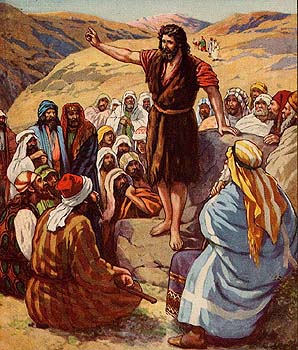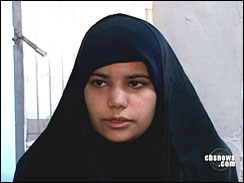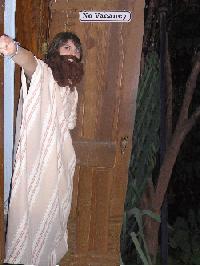Third Sunday in Advent at Mississippi Abbey
Scripture Readings: Zeph 3:14-18a; Phil 4:4-7; Lk 3:10-18
 We began today’s Gaudete Sunday celebration by hearing the call to “Rejoice!” Our Entrance antiphon began with this call. The prophet Zephaniah says we should “shout for joy….the Lord is in your midst!” Our Collect says that we are to rejoice because our Savior is coming. To this we might ask, “So what?” if we do not know what we need to be saved from and what we are to be saved for.
We began today’s Gaudete Sunday celebration by hearing the call to “Rejoice!” Our Entrance antiphon began with this call. The prophet Zephaniah says we should “shout for joy….the Lord is in your midst!” Our Collect says that we are to rejoice because our Savior is coming. To this we might ask, “So what?” if we do not know what we need to be saved from and what we are to be saved for.
Today’s gospel gives us the very important response to last week’s call to repentance. The people respond by asking another question, “What should we do?”
“What should we do?” is one of the three most fundamental questions we ever ask ourselves. It is about one of the three fundamental tasks in a person’s life. The three fundamental tasks in life are deciding what to believe, how to behave, and what to care about. They determine what kind of person we will become. And the kind of person we become will determine how we answer these questions.
What is significant here is that the crowd, the tax collectors, and the soldiers ask “what should WE do?” This question is best answered, i.e., lived out in a community that shares a story. Without a shared story about life, they don’t know what to believe and thus what to do. That’s because they don’t know what to care about. John tells them what the story is by telling them what to care about.
 John tells them to “bear worthy fruits of repentance.” They are to repent of self-seeking and seek the good of others. A life of self-seeking is what we are saved from; a life devoted to seeking the good of others is what we are saved for. The good of others is what they are to care about. One mightier than John is coming to show them how.
John tells them to “bear worthy fruits of repentance.” They are to repent of self-seeking and seek the good of others. A life of self-seeking is what we are saved from; a life devoted to seeking the good of others is what we are saved for. The good of others is what they are to care about. One mightier than John is coming to show them how.
At issue here is our authority for living: is it the culture or is it the way of the people of God? Our authority for living tells us what matters most; what is our criterion for importance; what is our Master End that motivates us? Before this we will be passive. Whatever we are passive before will form us.
 The mightier One is Jesus and we will recognize him as an authority for living, as worthy of admiration and emulation only if we know what we need to be saved from and what we need to be saved for…and if we know that efforts at saving ourselves have been futile. He knows our need for being saved because He is here for that mission given by His Father. Knowing the circumstances of our saving, we must care about it.
The mightier One is Jesus and we will recognize him as an authority for living, as worthy of admiration and emulation only if we know what we need to be saved from and what we need to be saved for…and if we know that efforts at saving ourselves have been futile. He knows our need for being saved because He is here for that mission given by His Father. Knowing the circumstances of our saving, we must care about it.
Last Sunday St. Paul told the Philippians to “value things that really matter.” He tells them to discern importance because we assign importance to that in life which makes a difference. As a life-style, the culture offers physical and psychological difference of pleasure and recognition. But they are short-lived.
John the Baptist and Jesus Christ, are calling us to the important-in-itself. They are calling us to caring; to seek the good of others. Sharing, honest dealings with others, and sensitivity to the disadvantaged are important-in-themselves. Its importance does not come from its immediate effect on us. The important-in-itself is a VALUE. Value is not so sense-perceptive. From the gospels we see that it is mostly experienced through the verbal. Jesus is called “the Teacher.” We hear the story. We hear it in a community. It makes a difference. The difference is in the touch of God, the taste of Him that is gratuitously given. That experience of His care for us is passed on in our care for others.
The Christian story is a story about the important-in-itself. To override the attraction of the sensual, we must live it in a Christian community. That will form character. A true self is formed when we personally, interiorly live out the enduring beliefs, conduct, and values of the Christian community. A false self is formed by the ever-changing fashions of the secular culture when we merely “follow the crowd.”
John the Baptist is telling us, “You were born an original; Don’t die a copy.”
Third Sunday in Advent at Mississippi Abbey
Scripture Readings: Is 61:1-2a, 10-11; 1 Thes 5:16-24; Jn 1:6-8, 19-28
 A Sunday school teacher wanted to teach her class about our need for a Savior. She asked them, “If you clean your room every day, wash the dishes, and keep everything neat and tidy, will that get you into heaven?” Some kids who earn an allowance for doing their chores naïvely said, “Yes.” Turning to others she said, “If you’re kind to animals, share your candy, don’t cheat at school or in games, and do good, will that get you into heaven?” Most of them thought so, but not everyone. So, she quizzed them once more, “If I sell my house and my car, give my money to the poor, and suffer everything without complaining, will that get me into Heaven?” Now everyone said, “Yes,” except for one young girl. Happy that someone in her class seemed to understand we can’t save ourselves by good deeds because we need a Savior, she asked the girl to explain what is necessary to get into heaven. She replied, “We need to die.”
A Sunday school teacher wanted to teach her class about our need for a Savior. She asked them, “If you clean your room every day, wash the dishes, and keep everything neat and tidy, will that get you into heaven?” Some kids who earn an allowance for doing their chores naïvely said, “Yes.” Turning to others she said, “If you’re kind to animals, share your candy, don’t cheat at school or in games, and do good, will that get you into heaven?” Most of them thought so, but not everyone. So, she quizzed them once more, “If I sell my house and my car, give my money to the poor, and suffer everything without complaining, will that get me into Heaven?” Now everyone said, “Yes,” except for one young girl. Happy that someone in her class seemed to understand we can’t save ourselves by good deeds because we need a Savior, she asked the girl to explain what is necessary to get into heaven. She replied, “We need to die.”
 Somewhere Flannery O’Connor writes that we naïvely skip over Original Sin and its consequences by believing in a justification of our own making. No, our good deeds can’t save us. The Prophets taught us that we need a Savior. The greatest of these was John the Baptist.
Somewhere Flannery O’Connor writes that we naïvely skip over Original Sin and its consequences by believing in a justification of our own making. No, our good deeds can’t save us. The Prophets taught us that we need a Savior. The greatest of these was John the Baptist.
Now, John’s school was held on the banks of the Jordan river. His first lesson was alarming. He cried out, “Who warned you to flee from the wrath to come? … Even now the axe is lying at the root of the trees … and the chaff he will burn with unquenchable fire” (Lk 3:9, 17). So, his students asked him, “What shall we do?” And he answered, “He who has two coats, let him share with him who has none.” And to tax collectors he said, “Collect no more than is appointed to you.” And to soldiers, “Rob no one… and be content with your wages.” But, isn’t this salvation by good works? Is John saying that we merit our way into heaven by good deeds? Heavens, no! His second lesson proclaimed our need for a baptism of repentance. It is not our deeds that wash us clean. It is God’s forgiving mercy. John’s third lesson pointed out our Savior: “Behold, the Lamb of God who takes away the sin of the world.” We need Jesus to wash us clean and baptize us with the Holy Spirit. Only then does John teach his fourth lesson on how to behave. Good deeds are not the means to salvation, they are the way we express gratitude for what Jesus has done to save us.
 A near tragedy in Iraq brought home to me the danger of naiveté in a fallen world. Al Qaeda terrorists trick mentally challenged persons, and even children into suicide bombing missions. A teenage girl was walking in an apparent daze toward a crowded marketplace. She had been drugged and was wearing a bomb ready to be detonated by a signal from a cell phone. Iraqi officers were suspicious and ordered her to stop. It happened that all cell phone signals were being jammed in that area as part of another security operation. A female soldier found a suicide vest wrapped around the girl’s waist. She was only 15 years old.
A near tragedy in Iraq brought home to me the danger of naiveté in a fallen world. Al Qaeda terrorists trick mentally challenged persons, and even children into suicide bombing missions. A teenage girl was walking in an apparent daze toward a crowded marketplace. She had been drugged and was wearing a bomb ready to be detonated by a signal from a cell phone. Iraqi officers were suspicious and ordered her to stop. It happened that all cell phone signals were being jammed in that area as part of another security operation. A female soldier found a suicide vest wrapped around the girl’s waist. She was only 15 years old.
The girl said, “I’m thankful that I didn’t get blown up. I had no idea the vest was a bomb. They told me it was a medical vest for back pain.”1
In our fallen world it’s dangerous to be naïve. But we have a Savior whose love washes away our sinfulness. This is the mystery we celebrate with joy and gratitude on this Guadete Sunday. Here are a few stories about children to cheer you up on this happy day.
 At this time of year, in the past, grade schools used to put on Christmas pageants. In fifth grade I was one of the angels announcing the good news of our Savior’s birth to the shepherds. On cue, we angels made our dramatic appearance in stocking feet and craft paper wings. I wanted to fly. Instead I slipped and fell on stage. Seeing an angel fall is very sad, especially for an angel who was trying to fly!
At this time of year, in the past, grade schools used to put on Christmas pageants. In fifth grade I was one of the angels announcing the good news of our Savior’s birth to the shepherds. On cue, we angels made our dramatic appearance in stocking feet and craft paper wings. I wanted to fly. Instead I slipped and fell on stage. Seeing an angel fall is very sad, especially for an angel who was trying to fly!
In another such pageant, Mary and Joseph ask for a room at the Inn. The innkeeper, a tough eighth grade boy, said gruffly, “Can’t you see the ‘No vacancy’ sign?” Joseph replied, “Yes, but can’t you see that my wife is expecting a baby any minute?” The innkeeper retorted, “Well, that’s not my fault.” Annoyed, little Joseph reacted impulsively and shot back, “Well, it’s not my fault either!” And it really wasn’t.
Last week we received a packet of 45 letters from the children of Notre Dame school in Burlington, Iowa. They were learning about our life of prayer. I was touched by the short poem one of them wrote in her letter: “Roses are red, violets are blue, prayers are important, so are you.” Isn’t that nice!
Finally, another student thought we might enjoy this little joke: “What do you call a bull that is sleeping?” Answer: A bulldozer!” Have a joyful Gaudete Sunday.
- CBS News, Dec. 5 and Dec. 8, 2008, The Ruthless Terror, posted by Elizabeth Palmer
